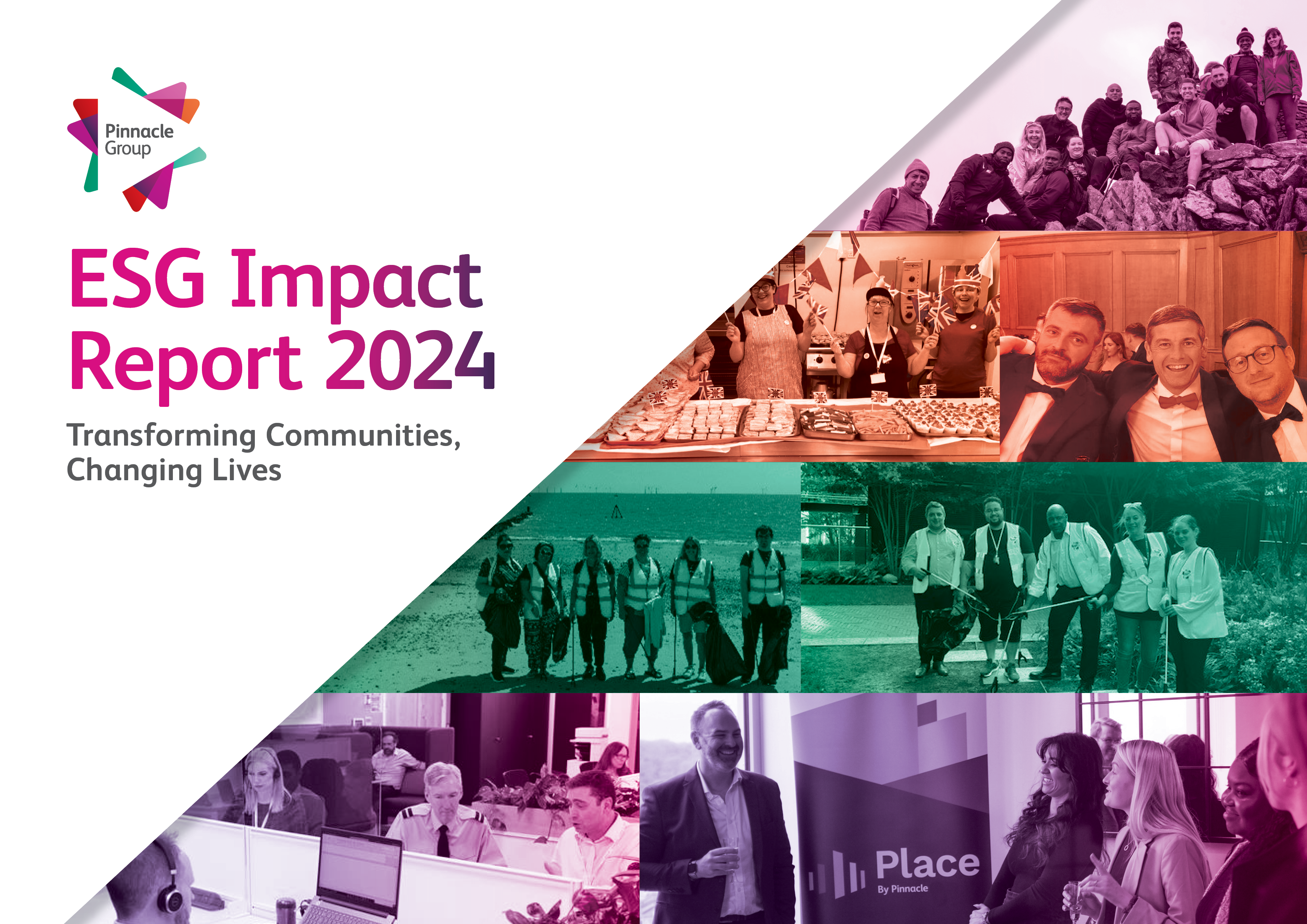Pinnacle Group’s Paul Carney awarded OBE in King’s Birthday Honours list
Paul Carney OBE, Chief of Staff, Pinnacle Service Families (PSF), has been appointed as an Officer of the Order of the British Empire (OBE) in the King’s Birthday Honours List 2025.
This honour recognises Paul’s outstanding service to the Army. He now continues his dedication to supporting military families in PSF.
Paul joined Pinnacle in April 2025 following a distinguished 28-year military career, culminating in his role as the Army Sergeant Major – the most senior non-commissioned soldier in the British Army.
Since joining Pinnacle, Paul has brought his deep understanding of military life and strategic leadership to the forefront of PSF’s mission to manage and enhance services for over 49,000 Service Family Accommodation homes across the UK. Paul has always been a “soldiers’ soldier” and this is at the heart of what drives his contribution to PSF.

“I am deeply honoured to receive this recognition. Serving the Army was a privilege, and continuing to support service families through my work at Pinnacle is equally meaningful. This award is a reflection of the incredible people I’ve worked alongside throughout my career, both in uniform and now as a veteran.”

Paul Carney
Chief of Staff, Pinnacle Service Families
“Paul's OBE is a testament to his exceptional leadership, integrity and commitment to those who serve, and their families. We are proud to have him as part of our team."

Perry Lloyd
Group Chief Executive
Paul’s award follows a series of strategic appointments to the Pinnacle Service Families Senior Leadership Team, reinforcing Pinnacle’s commitment to delivering high-quality services to the Armed Forces community.
Claire Kober on how new homes need public support
If the claims in Lord Ashcroft’s latest book are to be believed, Angela Rayner – feeling she was set up for a fall – threatened to quit over the government’s ambitious housing target. Tony Blair was allegedly called in, and a grace-and-favour pad at Admiralty House was offered to placate the agitated housing secretary.
Whatever the truth, it is clear that building 1.5 million homes over the course of this parliament is a huge undertaking and it is understandable that members of the public – and politicians – are sceptical.
History suggests this scepticism is well placed; completions have not breached the 200,000 mark since 1998 and the last time more than 300,000 homes were completed in a year was back in 1969.
While they had 12 housing ministers over the course of their time in government, the Conservatives failed to hit their target of one million new homes during their last term; and their peak of 234,400 net additional dwellings in 2022-23 fell far short of their goal of 300,000 new homes a year by the mid-2020s.
These statistics demonstrate the challenge Labour faces in trying to hit its own higher target, with housing minister Matthew Pennycook admitting last November that the task would be “more difficult than we expected in opposition”. While he called it an “incredibly stretching target”, he also said he was “convinced” it was deliverable and “essential”.
Given the history, is it right to have such an ambitious target? And if so, will aiming for it and potentially falling short further erode public trust in government?
"Effective communication about efforts and expected timelines is essential to maintain public trust."
Targets have been extensively used by central government policymakers across various areas, from the NHS to net zero. They signal political priorities and communicate intent to the public and those responsible for delivery. Housing targets focus the efforts of government and industry, and drive delivery. It is a truism that what gets measured gets done.
However, targets must be used thoughtfully, strategically and sparingly. Simply parroting a target in isolation won’t convince those affected by the housing crisis – or those in areas where development is proposed – that the right kind of progress will be made or a solution found.
With more than 100,000 households in temporary accommodation and house prices around eight times the average earnings, it is not just numbers that matter to people on the ground; affordability is also key.

Public perception
According to polling by More In Common last year, in contrast to a political and media debate that sees housebuilding through either a Nimby or a Yimby lens, half the public say their view on development in their area depends on the merits of the proposals in question.
The research shows that the public’s concerns centre on a perception that development would simply lead to more expensive houses being built and little to no new amenities such as schools and GP surgeries being created alongside them. If new housing is not more affordable than what is already on offer, and an influx of new homeowners puts strain on already stretched amenities, then communities will not support it.
Brits, generally speaking, are not against housebuilding. But their support is contingent on their concerns being addressed and progress consistently demonstrated.
The government must provide clear and honest explanations as it works towards its ambitious target. And Labour’s policy changes will take time to manifest. Reforming planning regulations, training skilled tradespeople and increasing investment in affordable housing require time to translate into tangible increases in housing numbers. Effective communication about these efforts and their expected timelines is essential to maintain public trust and build support.
Ministers reportedly anticipate no more than 200,000 net additional dwellings from the last financial year, creating a growing shortfall that will need to be addressed in the later years of this parliament. This could necessitate building as many as 400,000 new homes annually by the late 2020s to meet targets.
Gaining and maintaining support from all stakeholders will be crucial in achieving the housing target, despite the challenging circumstances. Scrapping it is not an option.

Claire Kober
Managing Director (Homes), Pinnacle Group
This article was originally featured in Property Week, on 21st May 2025.
Pinnacle Group marks 30-year anniversary with major contract wins and sustained growth
Pinnacle Group secured over 30 new contracts over the last financial year (April 24- March 25), marking £70 million in total contract value.
The achievement is part of a series of milestones that have seen the company expand its reach to new locations and increase its housing management portfolio by over 3,000 homes, bringing the total to over 74,000 homes nationwide.
These accomplishments came as Pinnacle celebrated its 30th anniversary, marking three decades as a provider of housing and community-facing neighbourhood services to 26,000+ delivery sites and over 230 workplaces.
https://youtu.be/r73pi5-81Tk
Pinnacle's new contracts included delivery partnerships with leading investors in affordable housing, such as Octopus-backed NewArch Homes, Pears-funded MTD Housing, and Nuveen-backed Preferred Homes Ltd.
The company also expanded its collaborations with investors such as L&G Affordable Homes, more than doubling the number of homes it manages for them, as well as securing significant housing management contracts with prominent organisations such as Manchester City Council, Birmingham City Council, and CBRE Investment Management.

The company also expanded its collaborations with investors such as L&G Affordable Homes, more than doubling the number of homes it manages for them, as well as securing significant housing management contracts with prominent organisations such as Manchester City Council, Birmingham City Council, and CBRE Investment Management.
Additionally, Pinnacle entered into a landmark 50-year contract with infrastructure giant HOCHTIEF to operate over 1,000 student rooms in partnership with Staffordshire University. Pinnacle also expanded its workplace operations for multinational manufacturer JCB and won new contracts worth over £2 million annually with Notting Hill Genesis to provide cleaning, caretaking, window cleaning, and waste services across five London boroughs.
A major highlight of the year was Pinnacle's new partnership with the Hyde Group. Hyde’s strategic investment in Pinnacle marked a transformative moment for both organisations, enabling them to amplify their impact across the housing and neighbourhood sectors.
Over the last year, Pinnacle's flagship Meadowship scheme, a partnership with Bromley Council, has successfully supported 127 homeless households into permanent homes, contributing to the alleviation of the ongoing temporary housing crisis. Since its inception, the scheme has helped nearly 400 homeless families find permanent housing.
As well as supporting local government, Pinnacle continues to be a trusted partner of the HM Government, last year supporting over 12,000 armed forces families as they move into MOD accommodation through its multi-million-pound contract with the Defence Infrastructure Organisation. The company has also played a crucial role in the Afghan Relocation and Assistance Policy, successfully assisting 170 Afghan families in transitioning to surplus MOD accommodation.
In addition to these achievements, Pinnacle has handled over 1 million customer calls across its 24/7 contact centres, significantly boosted its market rent and student accommodation portfolios, and achieved market-leading customer satisfaction scores.
"This past year has been remarkable for us. Our strategic partnership with Hyde Group, coupled with securing numerous high-value contracts, has positioned us to innovate more effectively and deliver high-quality, well-managed homes and communities nationwide. I am immensely proud of the profound impact our teams have had on communities across the UK and look forward to our continued expansion and success."

Perry Lloyd
Group Chief Executive
Pinnacle Group appoints former Army Sergeant Major Paul Carney to key military contract
Pinnacle Group has today announced the appointment of former Army Sergeant Major Paul Carney as Chief of Staff for Pinnacle Service Families (PSF), the company’s contract to manage 49,000 service family homes nationwide.
This strategic appointment highlights Pinnacle’s commitment to strengthening its senior leadership team and enhancing the service it provides to military families.
Paul – who has a 28-year military career – has most recently served as the Army Sergeant Major since 2021.
As the most senior non-commissioned soldier in the British Army, he has been a key advisor to the Chief of the General Staff as well as serving on operations in Macedonia, Kosovo, Iraq and Afghanistan.

In addition, he has held various leadership roles and has extensive experience in combat engineering, training, and strategic planning.
In his new role at PSF, Paul will oversee key priorities, ensuring the delivery of intelligent solutions, as well as enhancing operations to better serve military families.
"I am honoured to join Pinnacle and contribute to the vital work of supporting service families. My experience in the Army has given me a deep understanding of the unique challenges faced by military families, and I am committed to enhancing the quality of services provided."

Paul Carney
Chief of Staff, Pinnacle Service Families
The news follows the appointment of Sarah Pittaway, a former Army Officer and senior executive, as Divisional Director for PSF six months ago.
Sarah heads up the firm’s contract with the Defence Infrastructure Organisation, overseeing its 400-strong team across a National Service Centre in Liverpool and regionally across the UK.
“We are thrilled to welcome Paul to our team. His wealth of experience and dedication to service families will bring huge value to the company. We look forward to his contributions and the positive impact he will have."

Sarah Pittaway
Divisional Director, Pinnacle Service Families
Pinnacle Group welcomes Anna Le Jehan to Executive Committee
Pinnacle Group is delighted to announce that Anna Le Jehan, has joined our Executive Committee.
Anna joined Pinnacle Group as General Counsel in 2017. A qualified solicitor, she brought fifteen years of private practice experience advising on large-scale social infrastructure and regeneration projects across the UK, including the company’s flagship scheme, Oval Quarter – Myatts Field North.
Anna advises the business on a wide range of legal and compliance matters, drawing on her sector experience to support and develop integrated and innovative service delivery solutions for our communities.

“I am thrilled to welcome Anna to our Executive Committee, a pivotal step that reflects our commitment to the continued growth and development of Pinnacle. Since joining us in 2017, Anna has proven to be an invaluable member of our team, and her extensive legal expertise will undoubtedly be instrumental as we navigate the exciting opportunities that lie ahead."

Perry Lloyd
Group Chief Executive
“I am very pleased and proud to be joining the Executive Committee after twenty years of working with and for Pinnacle Group. I'm looking forward to collaborating with the senior management team and supporting the continued growth of the business."

Anna Le Jehan
General Counsel
Claire Kober: It’s time to lift the social housing stigma
For those following the passage of the assisted dying bill through parliament, there may not be any immediate parallels with the housing world.
However, whatever your views on the bill, a recurring concern is being played out in the debate. Despite the apparent safeguards in place, there persists a worry that vulnerable people may be coerced into ending their lives simply because they no longer wish to be a burden – to their families, their friends or the state.
This concept of ‘being a burden’ is deeply troubling and is evident across several sectors, including healthcare, mental health and housing. But why do people consider themselves a burden in the first place, and how does this problem play out in the housing sector?
In January, the G15 – a collective of London’s largest housing associations – published a report entitled ‘Taking the stigma out of social housing: the residents’ view’. Nearly half (45%) of social housing residents surveyed report experiencing prejudice or discrimination due to their housing status, while 43% say they have felt stigmatised when interacting with their landlord. With statistics like this, it is no wonder people begin to feel like a burden.
"It is not just about perceptions, but also about the impact this prejudice has on people’s lives."
The report delves into how stigma is formed and perpetuated, with residents highlighting the impact of politicians’ words, media depictions of social housing and social media narratives. Residents say they feel social housing tenants are portrayed as a burden to the taxpayer when, in reality, over half are in work.
The stakes are high. It is not just about perceptions, but also about the impact this prejudice has on people’s lives. It is five years since two-year-old Awaab Ishak died in Rochdale due to exposure to mould that was not addressed by his landlord. The Housing Ombudsman’s report highlighted a pattern of “othering” residents, attributing issues such as damp and mould to “cultural practices” and “lifestyle choices”, rather than addressing the underlying causes in the building.
The housing association involved, Rochdale Boroughwide Housing, has since undergone a complete change of leadership, and update reports show significant progress. At a conference in January, its new director of communications spoke about the need for teams to properly represent the communities they serve.
Need for decisive leadership
We also need to consider the current state of play. The government aims to bring forward 1.5 million homes by 2030, but in our pursuit of higher housing volumes, we must not overlook the need for decisive and capable leadership to drive attitudinal change.
Comments suggesting social housing residents ‘should be grateful’, are ‘entitled’ or have caused issues themselves are still common. Language matters and, in line with the Rochdale recommendations, we must root out these attitudes and provide clear information to residents.
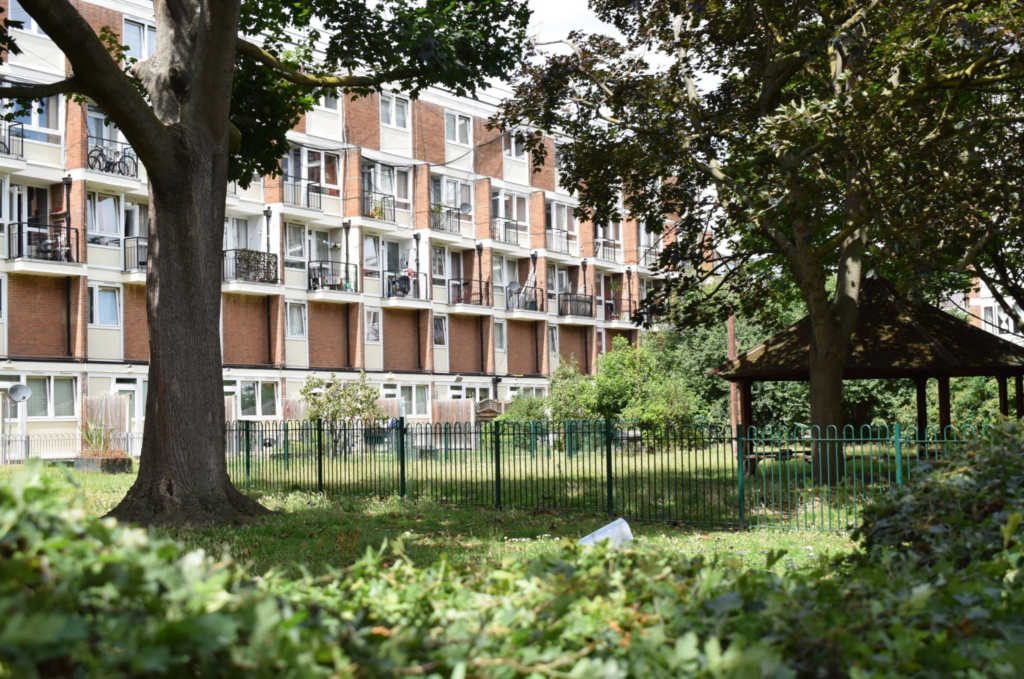
The affordable housing sector is at an inflection point, with more for-profit registered providers coming on board each month. These landlords reported owning over 38,500 homes in 2024, up 30% on the previous year. As well as securing stable, long-term returns, investors are looking to deliver positive social impact along with new solutions to intractable problems such as the number of people in temporary accommodation.
We are seeing new ways to create homes that challenge outdated perceptions of social housing and bring new players to the table, who also have a responsibility to challenge these depictions. For-profit registered providers, along with others in the housing sector, have an opportunity to shift perceptions by promoting a positive narrative on social housing; showcasing an accurate representation of social homes and the people who live in them.
This includes highlighting some of the excellent new homes being created. Regular registered providers, for-profit companies, housing organisations such as my own and the broader sector must work together to shift perceptions, which will bring substantial benefits to communities.
We must create an environment where all residents feel valued and respected, ensuring that social housing is seen as a vital, positive force in our communities.

Claire Kober
Managing Director (Homes), Pinnacle Group
This article was originally featured in Property Week, on 19th February 2025.
Pinnacle expands portfolio with five new sites for Bellway Homes
Pinnacle has significantly expanded its portfolio with Bellway Homes after securing five new sites under its Residential Management Services (RMS) division.
This development makes Bellway the division’s largest client, with a total of nearly 5000 homes managed for the client, across multiple sites. The five new sites provide an additional 1,463 homes to Pinnacle’s RMS portfolio.
The new sites are:
- Copperhouse Green in Dartford, Kent with 450 homes
- Eastside Quarter in Bexleyheath, London with 500 homes
- Legacy Wharf in Stratford, London with 196 homes
- Maybrey Works in Sydenham, London with 150 homes
- Eastbrook Village at Barking Riverside, with 167 homes



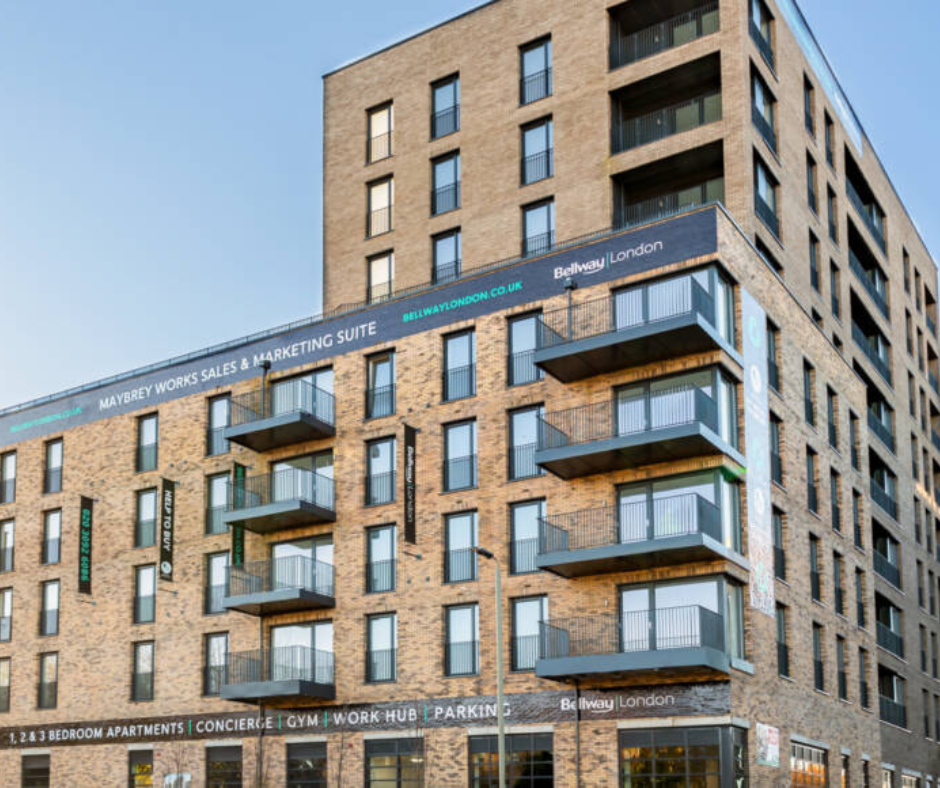

“We are thrilled to expand our partnership with Bellway Homes. Our team is dedicated to delivering exceptional service and supporting vibrant communities at these new locations. This milestone reflects our commitment to excellence and our ability to meet the diverse needs of our clients.”

Russell O'Connor
Head of RMS, Pinnacle Group
Pinnacle’s strong community credentials and reputation played a key role in securing the new business wins. We will oversee various services including leasehold management, service charge collection, concierge services, cleaning, and grounds maintenance.
Pinnacle’s RMS division specialises in providing comprehensive residential management services to leasehold properties across the UK. Our team ensures the smooth operation of residential developments, focusing on delivering high-quality services that enhance the living experience for residents.
Pinnacle secures dual contracts with Walsall Housing Group, reaffirming presence in the Midlands

Pinnacle Group is celebrating the re-award of two significant contracts with leading housing association landlord whg, marking 18 years since the initial contract that spurred our expansion into the Midlands.
The contracts encompass both communal area cleaning across all whg’s housing blocks and office cleaning services, reinforcing Pinnacle's commitment to providing high quality neighbourhood services.
The renewed contracts – which run for three years with scope to extend for a further five – solidify Pinnacle’s growing footprint in the Midlands, where the company now manages numerous contracts, including those with prominent regional partners such as Birmingham City Council and Midland Heart.
whg is a regional housing association with 22,000 homes owned and managed across the Midlands. With a diverse portfolio ranging from high-rise and low-rise blocks to family homes and older persons accommodation, whg is committed to creating sustainable communities through investment in people and places.
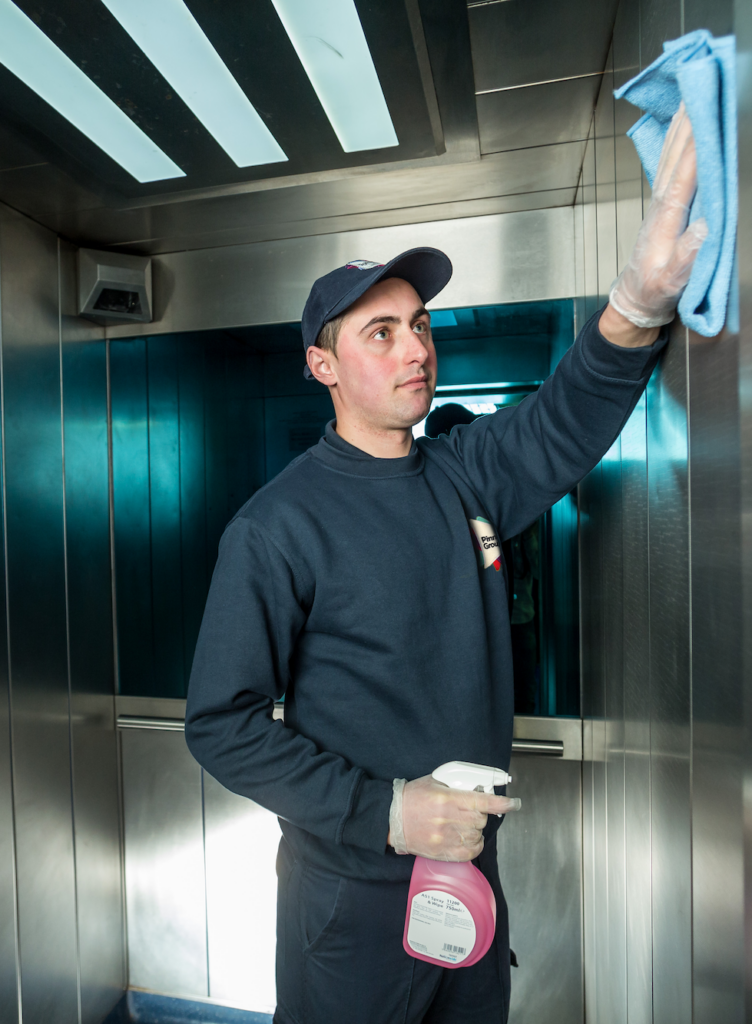
These contract renewals also secure employment for 40 local individuals, further contributing to the regional economy.
“We are incredibly proud to renew our partnership with whg, a relationship that began 18 years ago with our very first contracts in the Midlands. This renewal is especially meaningful as it allows us to continue delivering high-quality housing and neighbourhood services to residents with whom we have developed long-standing relationships. We look forward to maintaining our commitment to top tier cleaning services, ensuring the wellbeing of whg’s residents and employees.”

Raaj Bharania
Facilities Management Operations Director, Pinnacle Group
“We’re pleased to renew this long-standing partnership, ensuring our communal spaces are clean and welcoming for our customers. We know that well-maintained shared spaces make a real difference to how people feel about their homes and neighbourhoods, and we remain committed to creating communities to be proud of.”

Sarah Clarke
Director of Housing and Customer Services, Walsall Housing Group
Pinnacle Group to manage over 300 homes for Pears-backed MTD Housing
Pinnacle has been appointed to manage over 300 homes for MTD Housing, a for-profit registered provider backed by the Pears family.
This significant partnership will see Pinnacle overseeing a newly acquired portfolio by MTD Housing, which is dedicated to increasing the availability of affordable rental and shared ownership homes.
This portfolio totals 327 homes across London and the Southeast, helping Pinnacle to further its mission to enhance the provision of high-quality, affordable housing across London and the Southeast and ensure safe, comfortable and vibrant communities.

The Pears family, known for their extensive experience in financing and real estate, have a long-standing commitment to social and community causes through the Pears Foundation, which contributes over £20 million annually to various initiatives.
Pinnacle’s role in this collaboration includes tenant on-boarding and management, building compliance, defect management, maintenance and void management. With a track record of managing over 74,000 homes across various tenures—including affordable housing, PRS, student accommodation, and later living homes—Pinnacle is well positioned to deliver exceptional service to both clients and residents.
The appointment by MTD Housing follows Pinnacle’s broader success in securing key contracts over the last financial year. These include taking on additional homes with L&G Affordable Homes, managing portfolios for for-profit registered providers Funding Affordable Homes, and NewArch Homes, and expanding its geographical footprint with first-time contracts in Cornwall and Brighton.
“This partnership marks a significant milestone for Pinnacle. We are excited to bring our extensive experience providing services to affordable housing communities to support MTD’s vision of creating sustainable places. Together, we will work towards enhancing residents’ experiences and contributing positively to the local communities.”

Claire Kober
Managing Director - Homes for Pinnacle Group
Pinnacle Group develops affordable housing management portfolio with new contracts for Octopus-backed NewArch homes

Pinnacle is continuing to expand its nationwide affordable housing management portfolio after securing a partnership for-profit registered provider, NewArch Homes.
This growth is backed by substantial investment from Octopus Investments Ltd, known for their long-term commitment to delivering high-quality housing.
NewArch Homes, established in 2014, is dedicated to providing much-needed affordable homes through social rented, affordable rented, and shared ownership schemes.
Under the agreement, Pinnacle will manage a total of 59 homes across two locations, including 26 homes in Peterborough, and 33 homes in Exeter. The portfolio consists of a mix of affordable rent and shared ownership properties, providing diverse housing options for those in need.
Pinnacle will provide a full complement of housing management services, ranging from tenant on-boarding, tenancy management, building compliance, defect management, maintenance and void management.
"We’re excited to start work on this new portfolio, working in collaboration with NewArch. By managing these additional homes, we have an opportunity to further our mission of supporting local communities. Our partnership with NewArch allows us to provide more families with access to high quality affordable housing."

Claire Kober
Managing Director - Homes for Pinnacle Group
In addition to the Peterborough and Exeter sites, NewArch has a robust pipeline of 119 homes, bringing their total portfolio to 178.
"We are happy to announce our partnership with Pinnacle Group, which represents the significant expansion of our affordable housing portfolio. This collaboration underscores our joint commitment to providing high-quality affordable homes and services to communities in need. With Pinnacle's expertise in housing management, we are confident that these new homes in Peterborough and Exeter will greatly benefit local families and contribute to the overall wellbeing of these communities. This is a pivotal step in our mission to deliver much-needed affordable housing solutions at pace for UK households."

Georgia Kirby-Watt
Operations Director, NewArch Homes
The Pinnacles 2024
https://youtu.be/iRIc9pm5S4M
On 10th December, The Pinnacles, our annual staff awards ceremony, took place at the Victory Services Club in London, celebrating the exceptional achievements of our teams.
The event brought together over 150 Pinnacle colleagues to recognise and honour the dedication, talent, and hard work of colleagues across the organisation throughout 2024.
On the night, a total of 37 finalists were celebrated from across all areas of the business in seven different award categories, designed to champion both teams and individuals. The finalists were selected from over 340 nominations made by colleagues, who were encouraged to submit those who uphold Pinnacle’s values of trust, respect, involve, challenge and deliver excellence.
Hosted by Luke Smith, PSF Client Director, the evening featured addresses from Christopher Hodson, CFO; Perry Lloyd, CEO; and Andy Hulme CEO of the Hyde Group, with each award being presented by members of Pinnacle's Executive Committee.
Peregrine Lloyd, Chief Executive of Pinnacle Group, said: “The Pinnacles highlight our gratitude for colleagues who truly embody the essence of being a Pinnacle employee. This year, it was a pleasure to honor such inspiring accomplishments and acknowledge those who have made a positive difference in the communities we serve.”
Congratulations to all of this year's finalists and winners!
Employee of the Year
Janet Adams - Repairs Team Leader, Pinnacle Service Families (PSF)
One of the most highly anticipated awards of the evening is the Employee of the Year award. Each of our finalists is truly an asset to Pinnacle and we were thrilled to name Pinnacle Service Families, Repairs Team Leader Janet Adams as the winner.
From our PSF team, Jan is the heart of the National Service Centre. Her dedication, empathy, and resilience shine through in her work supporting clients, organising events, and fostering a welcoming environment. She embodies the spirit of Pinnacle, making a difference for colleagues and clients alike.

Congratulations to Janet and our other Employee of the Year finalists:
- Leon Simpson, Quality Manager, Projects & Governance
- Lucy Carlton, Property Manager, Place by Pinnacle
- Ryan McKeown - Housing Services Manager, PSF Administrator
- Lewis Spiers, Specialist Cleaning Operative, Soft FM
- Johnny Dankwa, Team Leader, Soft FM
- Cloe Allsop, Account Manager, B2B
- Andrew Atkinson, Industrial Supervisor, B2B
- Abraham Gibson, Facilities Assistant, Total FM
- Igor Kubiak, Facilities Assistant, Total FM
Team of the Year
Kenton and Tony - Soft FM Divsion
Kenton and Tony ensure Clapham Park Homes Estate maintains exemplary standards. Their attention to detail, tireless efforts, and impact on this flagship site exemplify Pinnacle’s values.
Congratulations to Kenton and Tony, and our other Team of the Year finalists:
- Technology & Innovation Development Team, Central
- Leicester Team, Homes
- Terry & Ricky, Soft FM
- David Brown Santaslo Team, B2B
- Ebbsfleet Academy, Total FM

Manager of the Year
Swarna Ragu - Team Leader
Swarna from our Brockley team, has served Pinnacle for 16 years and exemplifies resilience and leadership. Her ability to step up in critical moments and earn the trust of clients and colleagues is extraordinary.
Congratulations to Swarna and our other Manager of the Year finalists:
- Helen Barnes, Regional Customer Service Delivery Manager, PSF
- James Harrison, Contract Manager, Soft FM
- Diogo Florencio, Contract Manager, Soft FM
- Graham Callis, Contract Manager, Total FM
- Kate Mosey, Contract Manager, Total FM

Extra Mile Award
Jayne Rumble - Housing Officer, Pinnacle Service Families
The Extra Mile Award is for the best examples of one-off actions going well beyond the call of duty.
Jayne, from our Pinnacle Service Families team, showed extraordinary bravery when she responded to a fire at a military housing estate. Her swift actions in raising the alarm and evacuating neighbours prevented a potential tragedy.
Congratulations to Jayne and our other Extra Mile Award finalists:
- Gary Smith, Total FM
- Tina Smith, PSF
- Barry Holben, PSF
- Paul Mitchell, Homes, Brockley

Community Impact Award
Julie Impey - Community Manager
The Protect Our Planet Award is for the demonstration of outstanding positive contributions to our communities.
Julie has been with Pinnacle for 12 years and manages a Temporary Accommodation building for homeless individuals in the West End. Her compassion, resourcefulness, and unwavering support for residents have transformed lives and created a safe, welcoming environment.
Congratulations to Julie and our other Community Impact Award finalists:
- North Region South Housing Team, PSF
- Pinnacle North Multi-Contract Team
- Lewis Saunders, Soft FM

Protect Our Planet Award
Andra Stoicanescu - Contract Manager
The Protect Our Planet Award is for the demonstration of outstanding contributions to the environment.
Andra is a Contract Manager for Housing PFI Estate Services. She has championed biodiversity and community projects, from wildflower planting and bug hotels to supporting resident-led initiatives like community gardens. Her work benefits people and the environment.
Congratulations to Andra and our other Protect Our Planet Award finalists:
- Leeds & Kirklees Schools Team, Total FM
- John Gambrill, Total FM

The Innovation/Service Improvement of the Year Award
Ikram-Ul Haq - Regional Finance, Co-ordinator, Total FM
This award is for the demonstration of the best examples of innovation/service improvements in the year.
Ikram, Regional Finance Coordinator for Total FM South East, developed a Power BI dashboard revolutionising financial management. His dedication to smarter working has enhanced processes and improved service across contracts.
Congratulations to Ikram and our other Innovation/Service Improvement of the Year Award finalists:
- Sajan Raja, Data Analytics
- Kathryn McBurnie, PSF

ESG Impact Report 2024
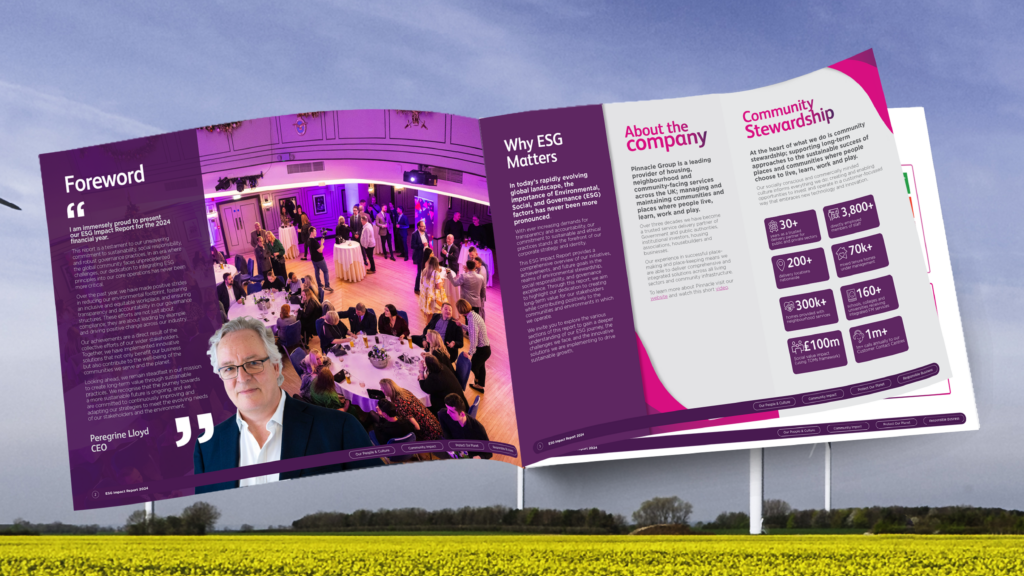
Our latest report detailing a series of key ESG pledge successes has today been published, highlighting our progress across the four key pillars of our ESG Framework.
Today we're delighted to publish our latest ESG Impact Report highlighting the exceptional service and positive difference we make to every community we serve.
This report not only celebrates our achievements but acts as a marker on our journey to net zero. This represents a substantial challenge but is one we welcome, and are making significant strides towards.
We've continued to make good progress in reducing our total emissions in FY24 compared to FY23, by reducing our total carbon footprint per £1m of revenue by 8% to 78.77 tCO2e.
Pinnacle continues to be a socially conscious and value-led business, this is demonstrated through the exceptional achievements of our people in protecting our planet, the social investments in our team and culture, and the communities we serve.
